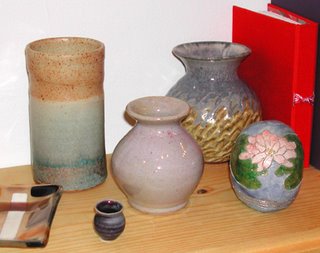
Two nights ago, Jae and I went to see An Inconvenient Truth, the new documentary about global warming by Al Gore, who evidently has been using his time very well since the 2000 election. The film was surprisingly engaging and definitely eye-opening and we stayed up until 3:30 in the morning talking about it. Jae said it was the best $10.75 he's spent in a long time.
It's worth noting right away that this isn't an anti-Bush film. It isn't Al Gore's attempt to save face after the election. And it isn't Super Size Me or even Fahrenheit 9/11. It is darker and more serious than these. There's nothing blatant about it that should upset conservatives politically speaking. It will, however, spur discussion and hopefully do a lot to raise awareness no matter how you vote.
That said, one of my first thoughts while watching the film was "Wow, the mainstream media really doesn't want us to know about these stories." That might be the biggest strength of the film: delivering valuable information in a clear, concise way that you probably won't get all in one shot anywhere else. And when given in one shot, the information makes a much bigger impact on your conscience.
The other thing that struck me was how engaging Gore is, and how much looser and more human he seemed compared to when he was running for President. The film consists mostly of Gore presenting the slide lecture on global warming that he's been passionately giving and refining for about 20 years. And he has all of the attributes of an effective professor: he's articulate, he's confident without being cocky, he has a vast understanding of his subject, and he really wants to share his knowledge with you. He's even actually funny sometimes. There are also some biographical moments that contextualize his passion and make him seem much more likeable than I'd thought him to be. I enjoyed the time in Gore's virtual presence and left the film wishing I could spend more time learning from him.
As for the science presented in the film, I found it to be completely convincing, and not at all trumped up like a lesser filmmaker might have done. In a story like this one, there's no need to make things up -- the evidence is already so dramatic and irrefutable. Gore's projections for the future seemed plausible too (albeit fairly horrifying), though that's where critics will take issue. But there's not much to argue with when the science mostly consists of graphs tracking things like the levels of CO2 in the atmosphere or actual temperatures recorded over time. It isn't fuzzy math. It's straight up numbers. Very hard to argue against.
As for the content of the film, there is just too much to say. Nobody has to make a case for whether or not global warming is a real thing, though the film does lay out the science for those of us who were not sure how it all works. So many troubling and heartbreaking examples are given about the effects of global warming, though not in a manipulative way. For instance, because spring is arriving sooner in some areas, caterpillars are hatching earlier and there's nothing for mother birds to feed their young. Cities built thousands of years ago at an elevation above the mosquito line are being infested because with the rise of average temperatures mosquitoes can survive at higher altitudes. And we've all heard about polar bears drowning due to the break up of the ice floes in the Arctic. In addition, the film talks about how so many weather records are being set these days. The ten hottest years on record occurred within the last 14 years with 2005 being the hottest. Last year a region of India received 37 inches of rain in 24 hours. In other areas, rivers and seas that have served the ecosystem and communities for (hundreds of) thousands of years have dried up within the last two decades. If you want more examples, just read the Daily Grist any day of the week -- today's mentions both a severe 18 month drought in England and the negative effects of frequent hurricanes on things like mangrove trees in Florida.
The aim of the film is to put all these pieces together, and when taken as a whole not only does the situation look much more critical, but it also looks more manageable than I'd ever considered it before. For as he points out toward the end, it's not as if we don't know what to do about global warming. We do know what to do and we have all the technology to make a significant difference. It's really a matter of action.
There is so much more evidence, so many other stories and facts we don't hear about, especially things happening in other countries. They are too many to enumerate. And for that reason alone this film is worth seeing. In fact, I can't think of a single reason not to see this film. If you can, see it in the theatre and don't wait for the DVD. The footage of glaciers and arid plains is really spectacular, and the graphs and charts look great all huge. If we could, Jae and I would personally send every single person we know free tickets to go see it and screen it around the clock for a month at Greenjeans. And if and when you do go, bring a kid if you can. Kids will get it and it could make a very positive impact on them.
Watching this film won't save the planet. But it can educate us to more deeply understand the problem and motivate us to take action that will.
Visit www.climatecrisis.net for more information, including theatres screening the film.
Skeptical? Read "Did Al Get the Science Right?" in Salon.com
http://www.salon.com/news/feature/2006/06/10/truths/index_np.html
(click on "free pass" to read entire article if you're not a subscriber)
Other blogs discussing this film:
http://www.two-twelve.net
Technorati tags:
An Inconvenient Truth
Al Gore
Global Warming
An Inconvenient Truth
Al Gore
Global Warming





























